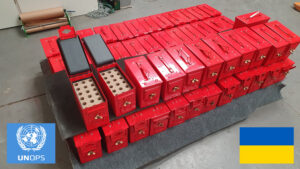
SJH Projects had the honour of supporting the 2007 Royal Institution Christmas Lectures. The subject this year was ?Back from the Brink? the science of survival. Over the course of the five lectures it covered different aspects of how the human body has adapted and evolved to survive in arduous conditions and circumstances. The lectures were presented by Dr Hugh Montgomery who had been part of the Xtreme Everest team with which SJH Projects had worked earlier.
The second lecture in the series ?Completely Stuffed? was shown on Christmas day and covered thirst and starvation. Part of this was to illustrate in an interesting manner the energy stored within food. Being shown on Christmas Day and with an audience primarily of children, the first example was a serving brussel sprouts. In energy terms a typical serving of about 100g equated to 7g of PE4. In late November this amount was placed in a pedal bin at a test range and filmed with real time and high-speed cameras. The idea of exploding sprouts was well received by the youngsters.
Having seen the effect of the sprouts, the audience were asked to estimate what would happen if the energy of a complete Christmas dinner (approximately 3000 kCal) was similarly converted. Their choices were litter bin, washing machine or car. The overwhelming choice was for the car, which was just as well as this is what had been used at the test range. The real time and high-speed film were very well received.
As part of the filming at the range we had also prepared a demonstration to show that the body was well designed to release the energy stored within food, whereas unlike explosives food does not respond to the stimulus of a detonator. A chopped up Christmas dinner set in gelatin was set on a table and a detonator inserted. The spectacular spread of food in all directions at once was captured most artistically at 2,500 frames per second. Unfortunately the time constrictions of the lecture meant that this did not make it into the programme. Some captured stills are shown in the attached gallery for posterity.
In the mid 1820s Michael Faraday, a former director of the Royal Institution, initiated the first Christmas Lecture series at a time when organised education for young people was scarce. He presented a total of 19 series, establishing an exciting new venture of teaching science to young people. The TV production for the 2007 series was carried out by Windfall Films who have a strong track record in science and factual programming.


